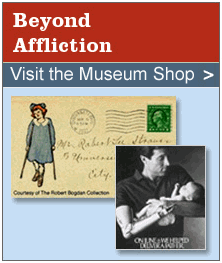Education: Essay
Language Matters: Handicapping An Affliction
by Dr. Douglas Baynton, The University of Iowa
(Interview, "Beyond Affliction," National Public Radio, 1998.)
The words that we use to describe people with disabilities have changed over time, and you can construct an interesting history of attitudes toward disability by looking at the words that people use. The word "affliction" was most commonly used in the nineteenth century. While people still use it today occasionally, it is particularly disliked by disability activists. And for good reason -- you find it usually in company with words like "victim," to emphasize the suffering or the horrors of disability.
But in the nineteenth century it had a specific meaning that related to cultural attitudes of the time, based in a Christian belief system. An affliction was what we would call a disability today, though it was also a broader term that could refer to various kinds of misfortunes. God, in His mysterious wisdom, had afflicted people with particular burdens, and they were supposed to bear them with patience and faith, trusting that their afflictions were part of some larger plan. People were afflicted for a reason -- to learn a lesson, to teach other people pity and charity, and so on. So, an affliction was not something to be overcome.
Now in the late nineteenth century, the term "affliction" began to disappear and people started using the term "handicapped." "Handicapped" arose in the context of evolutionary theory -- the world was being reinterpreted as a place of struggle, of competition, in the midst of industrial expansion and growing commercialism. It arose in the context of an economy that was fiercely competitive and where people were increasingly seen as competing individuals.
The term "handicapped" originally comes from a game called "Hand in Cap," which is a game of chance in which every person would have an equal chance of winning in each succeeding game that you played. Later it was applied to horse racing. You would handicap a fast horse by hanging stones on it to slow it down. It began, then, in the late nineteenth century to be applied to people with disabilities, and it always occurred in the phrase, "handicapped in the race for life," "handicapped in the struggle for existence," that sort of thing. It was very much tied to the kind of competitive, social-evolutionist worldview that was ubiquitous in the late nineteenth century. And that was the term that was used through much of the twentieth century until fairly recently, when the term "disability" began to replace it.
The interesting difference between "affliction" and "handicapped" is that "affliction" was not something you should overcome. While an "affliction" was a spiritual burden to be borne with faith and lived with as best as possible, in submission to God's wisdom, a "handicap" was a condition to be conquered, an impediment to worldly success that had to be overcome. Thus twentieth-century success stories about disabled people are most often stories of "overcoming."
How to cite this essay in a Chicago Manual of Style footnote: Douglas Baynton, “Language Matters: Handicapping an Affliction,” Disability History Museum, http://www.disabilitymuseum.org/dhm/edu/essay.html?id=30 (accessed date).






